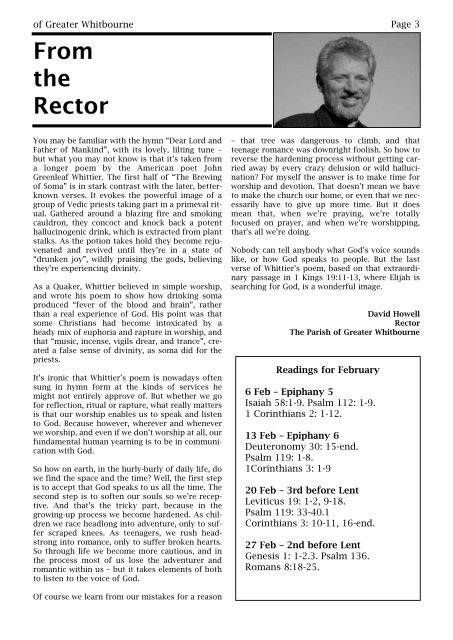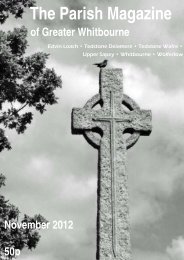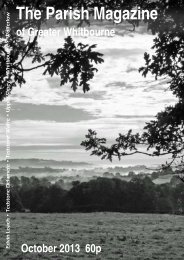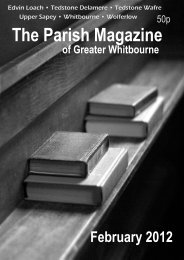Click - Parish of Greater Whitbourne
Click - Parish of Greater Whitbourne
Click - Parish of Greater Whitbourne
You also want an ePaper? Increase the reach of your titles
YUMPU automatically turns print PDFs into web optimized ePapers that Google loves.
<strong>of</strong> <strong>Greater</strong> <strong>Whitbourne</strong> Page 3<br />
From<br />
the<br />
Rector<br />
You may be familiar with the hymn “Dear Lord and<br />
Father <strong>of</strong> Mankind”, with its lovely, lilting tune –<br />
but what you may not know is that it’s taken from<br />
a longer poem by the American poet John<br />
Greenleaf Whittier. The first half <strong>of</strong> “The Brewing<br />
<strong>of</strong> Soma” is in stark contrast with the later, betterknown<br />
verses. It evokes the powerful image <strong>of</strong> a<br />
group <strong>of</strong> Vedic priests taking part in a primeval ritual.<br />
Gathered around a blazing fire and smoking<br />
cauldron, they concoct and knock back a potent<br />
hallucinogenic drink, which is extracted from plant<br />
stalks. As the potion takes hold they become rejuvenated<br />
and revived until they’re in a state <strong>of</strong><br />
“drunken joy”, wildly praising the gods, believing<br />
they’re experiencing divinity.<br />
As a Quaker, Whittier believed in simple worship,<br />
and wrote his poem to show how drinking soma<br />
produced “fever <strong>of</strong> the blood and brain”, rather<br />
than a real experience <strong>of</strong> God. His point was that<br />
some Christians had become intoxicated by a<br />
heady mix <strong>of</strong> euphoria and rapture in worship, and<br />
that “music, incense, vigils drear, and trance”, created<br />
a false sense <strong>of</strong> divinity, as soma did for the<br />
priests.<br />
It’s ironic that Whittier’s poem is nowadays <strong>of</strong>ten<br />
sung in hymn form at the kinds <strong>of</strong> services he<br />
might not entirely approve <strong>of</strong>. But whether we go<br />
for reflection, ritual or rapture, what really matters<br />
is that our worship enables us to speak and listen<br />
to God. Because however, wherever and whenever<br />
we worship, and even if we don’t worship at all, our<br />
fundamental human yearning is to be in communication<br />
with God.<br />
So how on earth, in the hurly-burly <strong>of</strong> daily life, do<br />
we find the space and the time? Well, the first step<br />
is to accept that God speaks to us all the time. The<br />
second step is to s<strong>of</strong>ten our souls so we’re receptive.<br />
And that’s the tricky part, because in the<br />
growing-up process we become hardened. As children<br />
we race headlong into adventure, only to suffer<br />
scraped knees. As teenagers, we rush headstrong<br />
into romance, only to suffer broken hearts.<br />
So through life we become more cautious, and in<br />
the process most <strong>of</strong> us lose the adventurer and<br />
romantic within us – but it takes elements <strong>of</strong> both<br />
to listen to the voice <strong>of</strong> God.<br />
– that tree was dangerous to climb, and that<br />
teenage romance was downright foolish. So how to<br />
reverse the hardening process without getting carried<br />
away by every crazy delusion or wild hallucination?<br />
For myself the answer is to make time for<br />
worship and devotion. That doesn’t mean we have<br />
to make the church our home, or even that we necessarily<br />
have to give up more time. But it does<br />
mean that, when we’re praying, we’re totally<br />
focused on prayer, and when we’re worshipping,<br />
that’s all we’re doing.<br />
Nobody can tell anybody what God’s voice sounds<br />
like, or how God speaks to people. But the last<br />
verse <strong>of</strong> Whittier’s poem, based on that extraordinary<br />
passage in 1 Kings 19:11-13, where Elijah is<br />
searching for God, is a wonderful image.<br />
David Howell<br />
Rector<br />
The <strong>Parish</strong> <strong>of</strong> <strong>Greater</strong> <strong>Whitbourne</strong><br />
Readings for February<br />
6 Feb – Epiphany 5<br />
Isaiah 58:1-9. Psalm 112: 1-9.<br />
1 Corinthians 2: 1-12.<br />
13 Feb – Epiphany 6<br />
Deuteronomy 30: 15-end.<br />
Psalm 119: 1-8.<br />
1Corinthians 3: 1-9<br />
20 Feb – 3rd before Lent<br />
Leviticus 19: 1-2, 9-18.<br />
Psalm 119: 33-40.1<br />
Corinthians 3: 10-11, 16-end.<br />
27 Feb – 2nd before Lent<br />
Genesis 1: 1-2.3. Psalm 136.<br />
Romans 8:18-25.<br />
Of course we learn from our mistakes for a reason
















